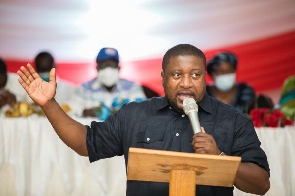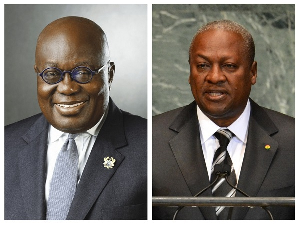 Finance expert, Prof Joshua Yindenaba Abor
Finance expert, Prof Joshua Yindenaba Abor
Finance expert, Prof Joshua Yindenaba Abor, has said policy interventions should be directed at attracting more private capital flows, especially FDI, in markets with less developed financial markets and weak institutions to drive financial inclusion.
Delivering a virtual lecture on the topic ‘Private Capital Flows and Inclusive Finance: The Moderating Roles of Domestic Financial Markets and Institutions,’ at the Centre for Global Finance, School of Finance and Management, SOAS University of London, he said although global financial inclusion improved by about 18% between 2011 and 2017, many people especially the poor, are still financially excluded.
Globally, about 31% of adults have no account with a financial institution or mobile money. For many parts of the world, especially low-income countries, financial inclusion remains a luxury.
In Ghana, although the ratio of banked-to-unbanked adults is higher than average for sub-Saharan Africa, majority of adults do not have access to formal financial services.
It is estimated that only 4.5million adults out of a total adult population of 15million have bank accounts.
Given these statistics, the study recommends that countries with well-developed financial markets and strong institutions should focus on further developing their financial markets and institutions while countries with poor institutional quality need private capital flows, especially FDI, the most to make progress in financial inclusion.
“Developing countries with underdeveloped financial markets and weak institutions need more private capital flows to drive inclusive financial development,” according to the presentation of Prof. Abor at the virtual lecture.
He notes that the study examined the impact of private capital flows (FDI, portfolio investment and debt flows) on financial inclusion and the moderating roles of domestic financial markets and institutions.
The results largely show that private capital flows have a direct positive effect on inclusive finance.
Further, the analysis reveals that while domestic financial markets - private sector credit and Stock market - have direct positive effects on financial inclusion, domestic financial markets may be a substitute for private capital flows, especially FDI flows.
The study found that marginal effect between private capital flows and financial markets at minimum and average levels are positive, while at maximum levels of financial market development, the substitution effect is seen. Similar results are seen when private capital flows and institutional quality interact.
The study also shows that per capita income, ICT penetration, and share of adult population improve financial inclusion.
While secondary education is not enough to improve financial inclusion, higher gross tertiary enrolment consistently improves financial inclusion.
The study used OLS as well as 2SLS and GMM to control for possible endogeneity issues to estimate data for 90 countries from 2004 to 2019.
The lecture was organised by The Centre for Global Finance. The centre is a group of experts who believe in scientific discoveries that play a critical role in generating policy and practice for the transformation of society and the improvement of lives. They undertake rigorous research that aims to significantly enhance the knowledge, practice and policy in the areas of financial stability, inclusive and sustainable growth, and economic transformation.
Prof. Joshua Yindenaba Abor is a financial economist, qualified accountant and Professor of Finance at the UGBS.
He is a former Dean of UGBS, a Fellow at the Ghana Academy of Arts and Sciences, and an External Fellow at the Centre for Global Finance, SOAS University of London.
He is also a researcher with the African Economic Research Consortium and a member of the Bank of Ghana Monetary Policy Committee.
- Financial sector clean-up: 900 people dead, pay us by June 30 - GCFM customers to government
- Bank of Ghana governor denies calling NDC MPs hooligans
- Ghana to become top destination for fintech investments – BoG
- Here is why BoG suspended forex trading licences of GT Bank, FBN Bank
- Bank of Ghana, Development Bank Ghana to launch 3i Africa Summit in Accra
- Read all related articles










